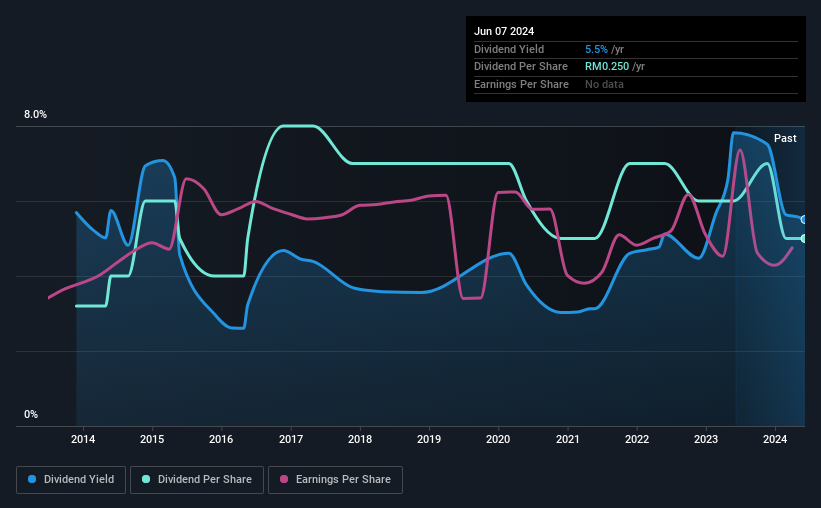- Malaysia
- /
- Industrials
- /
- KLSE:HAPSENG
It Might Not Be A Great Idea To Buy Hap Seng Consolidated Berhad (KLSE:HAPSENG) For Its Next Dividend

Hap Seng Consolidated Berhad (KLSE:HAPSENG) stock is about to trade ex-dividend in four days. The ex-dividend date occurs one day before the record date which is the day on which shareholders need to be on the company's books in order to receive a dividend. The ex-dividend date is of consequence because whenever a stock is bought or sold, the trade takes at least two business day to settle. In other words, investors can purchase Hap Seng Consolidated Berhad's shares before the 12th of June in order to be eligible for the dividend, which will be paid on the 27th of June.
The company's next dividend payment will be RM00.10 per share. Last year, in total, the company distributed RM0.25 to shareholders. Last year's total dividend payments show that Hap Seng Consolidated Berhad has a trailing yield of 5.5% on the current share price of RM04.54. We love seeing companies pay a dividend, but it's also important to be sure that laying the golden eggs isn't going to kill our golden goose! So we need to check whether the dividend payments are covered, and if earnings are growing.
Check out our latest analysis for Hap Seng Consolidated Berhad
Dividends are typically paid from company earnings. If a company pays more in dividends than it earned in profit, then the dividend could be unsustainable. Hap Seng Consolidated Berhad paid out more than half (70%) of its earnings last year, which is a regular payout ratio for most companies. A useful secondary check can be to evaluate whether Hap Seng Consolidated Berhad generated enough free cash flow to afford its dividend. Dividends consumed 72% of the company's free cash flow last year, which is within a normal range for most dividend-paying organisations.
It's encouraging to see that the dividend is covered by both profit and cash flow. This generally suggests the dividend is sustainable, as long as earnings don't drop precipitously.
Click here to see how much of its profit Hap Seng Consolidated Berhad paid out over the last 12 months.

Have Earnings And Dividends Been Growing?
Companies with falling earnings are riskier for dividend shareholders. If earnings decline and the company is forced to cut its dividend, investors could watch the value of their investment go up in smoke. So we're not too excited that Hap Seng Consolidated Berhad's earnings are down 5.0% a year over the past five years.
Many investors will assess a company's dividend performance by evaluating how much the dividend payments have changed over time. Since the start of our data, 10 years ago, Hap Seng Consolidated Berhad has lifted its dividend by approximately 4.6% a year on average. Growing the dividend payout ratio while earnings are declining can deliver nice returns for a while, but it's always worth checking for when the company can't increase the payout ratio any more - because then the music stops.
The Bottom Line
Should investors buy Hap Seng Consolidated Berhad for the upcoming dividend? It's never good to see earnings per share shrinking, but at least the dividend payout ratios appear reasonable. We're aware though that if earnings continue to decline, the dividend could be at risk. With the way things are shaping up from a dividend perspective, we'd be inclined to steer clear of Hap Seng Consolidated Berhad.
Having said that, if you're looking at this stock without much concern for the dividend, you should still be familiar of the risks involved with Hap Seng Consolidated Berhad. In terms of investment risks, we've identified 2 warning signs with Hap Seng Consolidated Berhad and understanding them should be part of your investment process.
If you're in the market for strong dividend payers, we recommend checking our selection of top dividend stocks.
Valuation is complex, but we're here to simplify it.
Discover if Hap Seng Consolidated Berhad might be undervalued or overvalued with our detailed analysis, featuring fair value estimates, potential risks, dividends, insider trades, and its financial condition.
Access Free AnalysisHave feedback on this article? Concerned about the content? Get in touch with us directly. Alternatively, email editorial-team (at) simplywallst.com.
This article by Simply Wall St is general in nature. We provide commentary based on historical data and analyst forecasts only using an unbiased methodology and our articles are not intended to be financial advice. It does not constitute a recommendation to buy or sell any stock, and does not take account of your objectives, or your financial situation. We aim to bring you long-term focused analysis driven by fundamental data. Note that our analysis may not factor in the latest price-sensitive company announcements or qualitative material. Simply Wall St has no position in any stocks mentioned.
About KLSE:HAPSENG
Hap Seng Consolidated Berhad
An investment holding company, engages in the plantation, property investment and development, credit financing, automotive, trading, and building materials businesses in Malaysia and internationally.
Excellent balance sheet average dividend payer.


